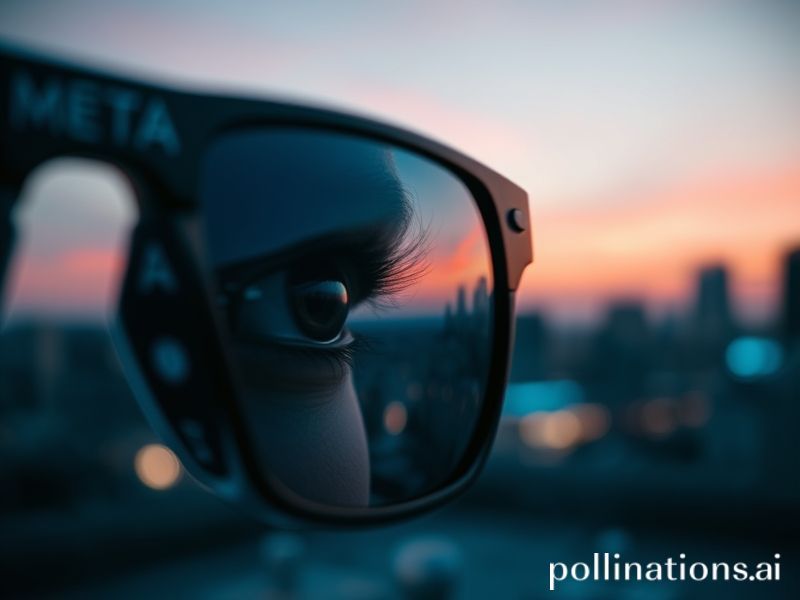Meta Glasses Go Global: The World Puts Its Worst Face Forward
PARIS — Somewhere between a croissant and a nervous breakdown, I found myself staring at a pair of Ray-Bans that can translate Mandarin in real time, tell me my blood sugar is spiking, and—because why not—live-stream my existential dread to a server in North Virginia. Meta’s newest “smart glasses” have landed on five continents at once, like polite little missionaries preaching the gospel of perpetual self-surveillance. If you feel watched, relax: that’s simply the product working as intended.
The rollout is textbook techno-imperialism. First stop: the glassy boulevards of Dubai, where influencers already wear surgical masks for vanity and can now add facial-recognition AR overlays to rate brunch spots. Next, a pop-up in Seoul’s Gangnam district, because nothing screams “discreet” like a swarm of K-pop fans wearing camera-enabled eyewear that uploads every squeal to Meta’s cloud. São Paulo commuters tried them on between traffic jams and muggings—an excellent stress test for the “instant 911 video” feature, assuming anyone answers. Meanwhile, in Lagos, the glasses’ real-time currency converter helpfully informs street vendors that the dollar is still king and their mangoes are underpriced.
Europe, ever the reluctant bride, greeted the launch in Berlin with a protest led by artists wearing cardboard spectacles labeled “1984 was not a user manual.” The EU Commission promptly opened an antitrust probe, because nothing accelerates innovation like a 4% global revenue fine. Over in Washington, senators who still think TikTok is a breath-mint demanded hearings, then asked Meta to donate a few pairs so staffers could film re-election ads from the treadmill.
The geopolitics get spicier. China’s state media warns that the glasses “could map national infrastructure,” which is rich coming from a country that already did that with cheap drones and TikTok dances. Russia simply banned them, citing “espionage,” then announced a domestic clone called “Z-Rays” that crashes every time someone says “navalny.” Israel’s Ministry of Defense wants them for urban patrols; Palestine’s Ministry of Health wants them to document checkpoints. Everyone gets a feature film, whether they asked to star or not.
For the average human, the pitch is seductive: hands-free photos, instant translation, reminders that you left the stove on. The catch? You become the product’s unpaid cinematographer, feeding Meta’s insatiable algorithm a 24/7 Wes Anderson remake of your daily tedium. Privacy advocates call this “data colonialism,” a term that sounds academic until you realize your retinal scan now sits between someone’s brunch photo and a Nazi meme in an Ohio server farm. The company swears the LED indicator will always show when recording, a promise as comforting as a pilot announcing the seat-belt sign on a crashing plane.
And yet, the queue snakes around the block. Why? Because the glasses solve the last remaining friction between vanity and memory: the need to hold up a phone. We can now document every meal, every fleeting sunset, every petty triumph without the indignity of looking like tourists. Future generations will inherit not shoeboxes of faded Polaroids but infinite 4K reels of us staring into middle distance wondering if we turned the iron off. Historians will call it the Age of Perpetual Receipts.
The darker punchline is what happens when the feed goes the other way. Police departments from London to Lagos already request “voluntary” uploads to solve crimes. Dictatorships skip the “voluntary.” Employers will check if you really had the flu or just binge-watched squid games in your Meta Ray-Bans. Your insurance premium will tick up because the glasses noticed you blinked too slowly at a crosswalk. The device doesn’t just see the world; it judges it, monetizes it, and occasionally doxxes it.
So here we are, international citizens of the Panopticon, applauding ourselves for inventing a mirror that watches back. The glasses will get lighter, cheaper, more invisible. One day we’ll forget they’re on—until a pop-up ad floats across our corneas offering a discount on the coffin we just glanced at in a funeral home window. Progress, after all, is just grief with better product placement.







